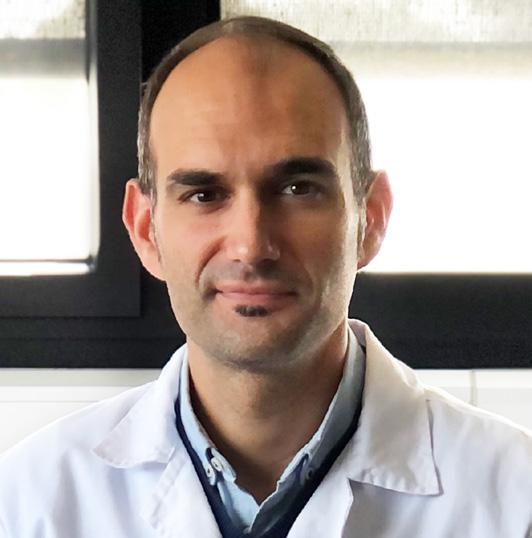
1 minute read
Amazing careers: Meet Manuel Gahete
Dr Manuel Gahete is the Head of Molecular Hepatology at the Maimonides Biomedical Research Institute of Córdoba (IMIBIC), Spain. He is a member of the ESE Science Committee and received the prestigious Jens Sandahl Christiansen Basic Science Award from ESE in 2023. His research focuses on dysregulation of mRNA and protein homeostasis, as well as the involvement of metabolic changes in different liver pathologies. Here, he talks to Juan Manuel Jiménez-Vacas, Deputy Editor of EYES News.
What led you to choose endocrinology?
I have had contact with endocrinology from the beginning of my career, as I joined the Molecular and Cellular Endocrinology Group at the University of Córdoba during my graduate studies. That was my first experience in the field, but most of my subsequent research activities have been related to endocrinology.
How did your journey begin?
Joining the Molecular and Cellular Endocrinology Group early in my biological studies allowed me to closely experience laboratory research. During that time, through an Endocrine Society Summer Research Fellowship, I had a short research stay at the University of Illinois in Chicago, USA (2004). This was so gratifying that I decided to pursue a scientific career and, in 2006, I started my PhD.
What key moments have there been in your career?
Although the negative and frustrating moments, such as inexplicable results, grant rejections etc., are usually when you learn the most, I maintain that the positive moments are the most important. In my early career, I remember with special warmth the acceptance of my first research article as first author and my first oral communications at ECE and the Endocrine Society meeting. More recently, the first national project as principal investigator and the first article published as last author have been very special milestones.
What has been your greatest achievement so far?
From a professional point of view, it has been the initiation and consolidation of an independent line of research as Head of Molecular Hepatology at IMIBIC. From a scientific point of view, it is the teamwork we have developed in recent years in the University of Córdoba (along with the groups of Professors Justo P Castaño and Raúl M Luque), demonstrating the implications of the alteration of the splicing process in endocrine and metabolic diseases.
What have been your greatest challenges?
One major challenge in our careers is to develop clinically relevant research that could generate impactful results with the potential to be translated to clinical practice. I think it is crucial to build a proactive relationship between translational and clinical researchers to align research efforts and build research teams that are capable of working together and providing a more profound knowledge of endocrine diseases.
Have the obstacles facing early career endocrinologists changed?
The obstacles have mostly been maintained in recent years, including limited opportunities to access a scientific career, unstable (or even precarious) work conditions, lack of a wisely designed scientific career path, insufficient research funds and the (unfortunately common) ‘publish or perish’ dilemma. However, all these obstacles can be overcome by means of interest, perseverance and commitment. In this regard, it is important to find the appropriate mentor(s), and to have a proactive and positive attitude, including active participation in scientific activities organised by scientific societies.
Who or what has inspired you?
Although it is a difficult question, I think my mentors have had a big impact on my scientific career. From my initial determination to pursue a research career to defining my current research direction, my mentors from my predoctoral period (Professors Castaño and Luque) and my postdoctoral training (Professor Rhonda D Kineman) have been a source of inspiration. At the moment, defining novel research lines and interacting and discussing results with the young investigators in my group are also extremely inspiring.
What advice would you give to people starting their career today?
Endocrinology and metabolism are very exciting, and areas remain to be explored in clinical and translational research. There are many questions to be resolved in the clinical management of patients and in understanding the biological bases of endocrine diseases. Therefore, my recommendation would be to stay motivated and curious to address such uncertainties, and also open-minded in order to provide fresh, motivating hypotheses and answers.
Where can EYES make the biggest and most useful impact?
I think the impact EYES is having, fostering the active engagement of early investigators with endocrinology societies and supporting them in their careers, is enormous. Young investigators face a series of challenges, and EYES can help by promoting activities aimed at increasing research opportunities or stimulating the development of collaborative connections with other European groups.
What are your top tips for success?
I think there are no general tips apart from enjoying research. How to develop a scientific career and achieve success are highly dependent on a multitude of intrinsic and extrinsic factors, such as personal expectations, laboratory (or clinic) environment, research opportunities, or even your city or country. However, being engaged and motivated by the research and being able to enjoy the small (or, sometimes, big) achievements is crucial for scientific success.
What hobbies do you have that are unrelated to science?
I think having non-scientific interests is crucial, both to celebrate the good moments in science and to disconnect from stress and the not-so-good moments. When I’m out of the office and the lab, I like to enjoy life with my family and friends, to travel and visit new cities and countries, and to practise sports.











